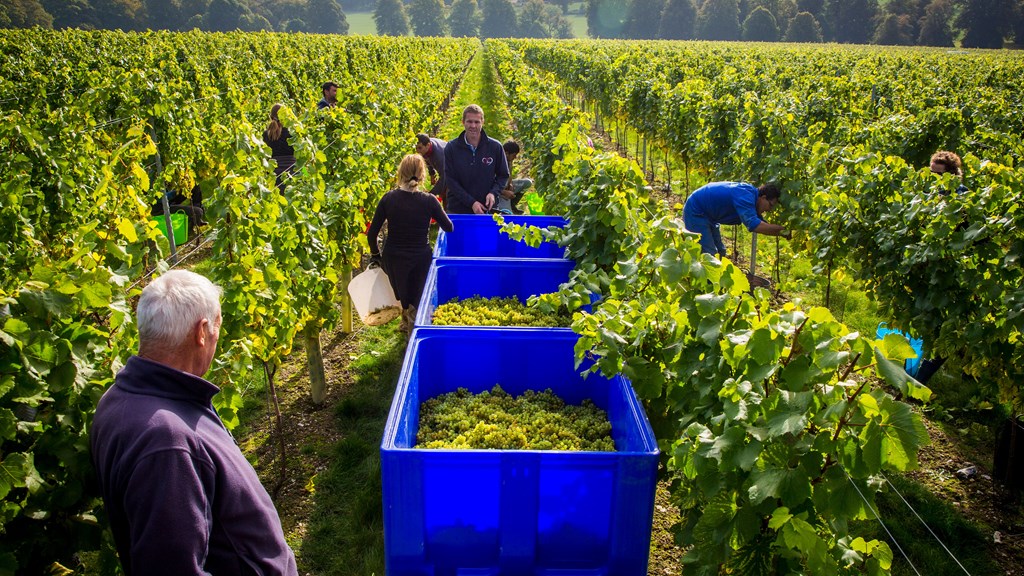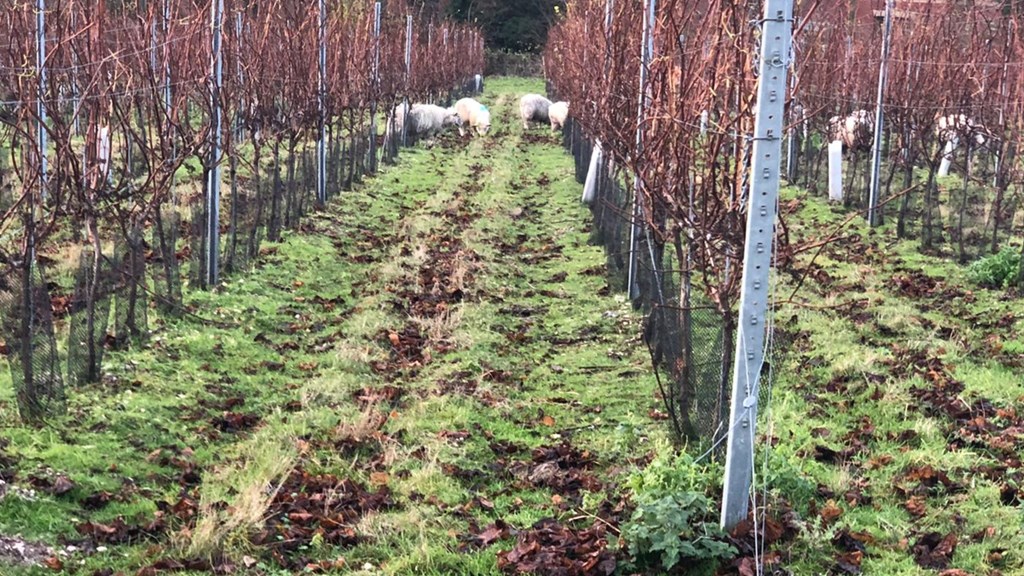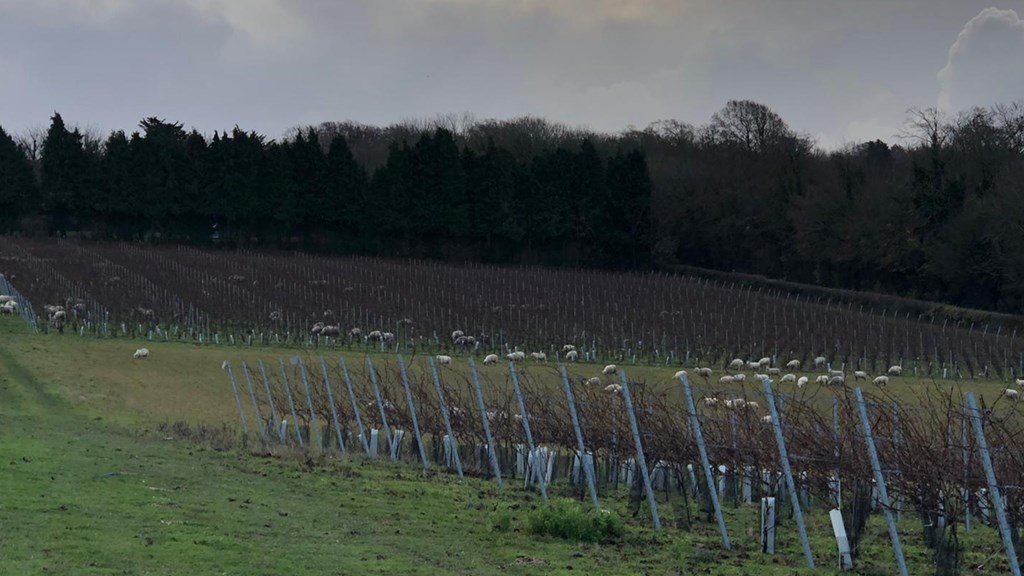Your organisations purpose:
Ruth and Charles Simpson have made award-winning wines at their stunning, southern French Estate, Domaine de Sainte Rose, since 2002. In 2012 they brought their savoir-faire back to the UK, establishing Simpsons’ Wine Estate in Kent.
The Simpsons now have 38 hectares of vineyards established on the iconic chalk terroir of the North Downs, a state-of-the-art winery and an elegant tasting room, complete with world’s first winery helter-skelter! With a strong focus on provenance, Simpsons’ Wine produces a highly-acclaimed range of exclusively estate grown still and sparkling wines, which can be found in some of the finest retail and dining outlets both nationally and internationally.
What is your impact initiative?
As a circularity initiative, we have started composting our grape marc (skins/pips/stalks), that is created during the grape pressing process, then using this compost to fertilise our vineyards. Prior to this, the marc was taken away by a local cattle farmer to feed to his livestock. Grape marc would usually take a very long time to compost into a usable amendment to the soil, so we kick-started this process by approaching the local wildlife park (Howletts) to request some of their enclosed animal manure.
Howletts were happy to provide several tons of elephant and horse manure and this combination of manure and marc was deposited in a corner of one of our vineyards and covered over for a full year. The compost was then spread on our vineyards the following spring as a completely organic fertiliser. This is in addition to the sheep grazing that we offer to local farmers in the vineyards post-harvest and prior to the start of pruning. Having sheep in our vineyard not only adds more organic fertilizer directly into the soil, but also avoids the need for inter-row and headland mowing during that period.
The impact your initiative has had:
The goal is to re-use what has been created as a by-product of our core business and also to reduce artificial inputs. By doing this we will increase the levels of organic matter in our soil and also increase the biological activity levels and nutrient recycling. We already encourage this by inter-row mulching of our vine prunings in the early spring and by allowing sheep to graze on the vineyards in the winter, thus receiving their manure directly onto the land. The fact that Howletts cannot use the manure they generate in the park, means that we are also offering a solution to them.
This initiative not only fulfils our goals to maintain and improve soil health and to reduce fertiliser inputs, but also to promote a transition towards a circular economy. These goals are set by the Sustainable Wine Scheme of Great Britain and the Walpole Sustainability Manifesto, both important programmes that we use to guide our sustainable practices at Simpsons' Wine Estate.
Have you observed any direct benefits to your business or organisation as a result of the initiative?
We have removed the need to purchase commercial fertilizer going forward and the need to for a farmer to make multiple journeys to collect the marc as in previous years. This in addition to the sheep grazing has also reduced fossil fuel use and cost, eliminating the need to mow the vineyards over the winter months. This desire is in line with the goals of the Sustainable Wine Scheme of Great Britain.
As a grower producer, our vineyards and winery are now formally accredited in this scheme having successfully completed our first audit. Our visitors love the circularity story that we can tell as a result of this composting initiative and the fact that we are working with another local business (Howletts) to achieve it.
Have you observed any benefits to your visitors as a result of the initiative?
Our visitors appreciate that this initiative will reduce artificial inputs onto the vineyard and therefore result in a more sustainably produced wine. This initiative supports a key element of our brand story, which is that as a family owned grower producer, we are 100% committed to reducing our environmental impact. Evidence of this is that in June 2022 our 30 hectares of vineyards received full accreditation from the Sustainable Wine Scheme of Great Britain, followed in the first week of July by accreditation for our winery. In the vineyard, this scheme aims to maintain and improve soil health, to conserve the vineyard environment and promote biodiversity, to reduce pesticide and fertilizer inputs and to reduce our carbon footprint per hectare.
Another goal of this scheme is to reduce non-renewable energy consumption and we successfully achieved this in September 2021, when we installed a 30kw solar PV array on our new warehouse roof. In optimal conditions, this array easily covers all normal office and winery functions as well as exporting significant energy to the grid. We are also signatories to the Walpole Sustainability Manifesto, who in addition to its pledges to safeguard the environment and natural resources, has two additional sustainability pillars. These are: to promote the transition towards a circular economy and encourage businesses to work with ‘responsible’ suppliers who can provide traceability across their supply chain; and to advocate equal and respectful working conditions, complying with human rights and labour laws and eliminating the median gender pay gap.
What category/categories does your initiative fall under?
- Food for Good – reducing food miles, local seasonal produce, plant-based & organic
- Reducing waste
- Nature positive initiatives – conserving, preserving or restoring landscapes, habitats & wildlife
Address:
The Barns, Church Lane, Barham, Canterbury, CT4 6PB, Kent
Website:
Contact email address:
info@simpsonswine.com






